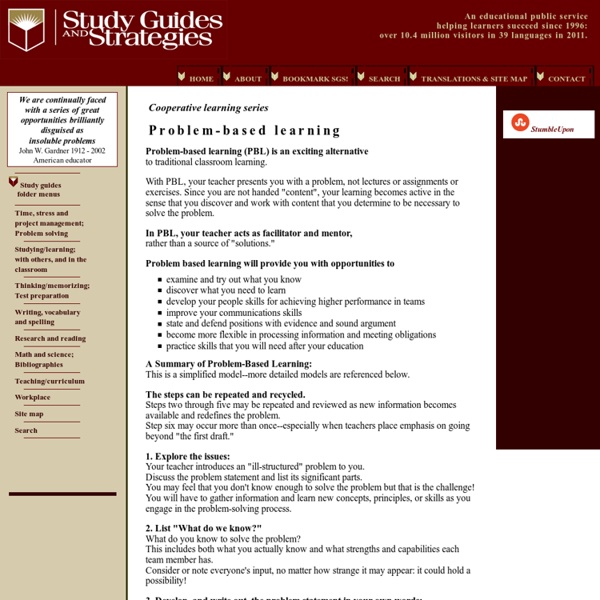



http://www.studygs.net/pbl.htm
Upgrade your KWL Chart to the 21st Century One of the take aways from the Curriculum Mapping Institute this past week was that it brought an upgrade to THE trusted KWL (Know, What to Know and Learned) Chart to the forefront. It seems a no brainer…one of those things… “I should have thought about it”… So what is this upgrade all about? An “H” snuck into the Acronym! What does this “H” stand for”?Why is this an upgrade for the 21st century?
PROBLEM BASED LEARNING DESCRIPTION As an MBA, you will have to be an accomplished problem-solver of organizational design and change situations. You will also have to be a self-directed learner your entire professional life, as knowledge in the field of management will change, and you will continuously be meeting new and unexpected challenges. The consideration of these factors such as these dictates the wisdom of a problem-based, student-centered, self-directed program that will allow you, the student, in collaboration with your group and instructor, to design an experience tailor-made to your individual needs. What Is Problem-Based Learning (PBL)? Problem-based learning (PBL) is an approach that challenges students to learn through engagement in a real problem. Problem-based learning is student-centered.
Project Based Learning Search for a PBL Plan PBL Tools What is standards-focused Project Based Learning (PBL)? What is PBL? To help teachers do PBL well, we created a comprehensive, research-based model for PBL — a "gold standard" to help teachers, schools, and organizations to measure, calibrate, and improve their practice. In Gold Standard PBL, projects are focused on student learning goals and include Essential Project Design Elements:
Getting Started with Challenge Based Learning Challenge Based Learning is an engaging multidisciplinary approach to teaching and learning that encourages students to leverage the technology they use in their daily lives to solve real-world problems. Former Michigan Technology Teacher of the Year and Apple Distinguished Educator Andy Losik provides this getting started guide to implementing CBL in your classroom. What does CBL look like in the real world? WZZM13.com story Teach your students the "Path to Innovation" with this great Edheads.org activity: Design a Cellphone.
Problem Based Learning, PBL explained, definition, defined Traditionally, students learn by listening to lectures and reading, and are assessed on their ability to recall and communicate what they have learned. With problem-based learning, students are assessed on their ability to go through a problem solving process. Research shows that PBL gives the learner greater long-term benefits than traditional learning, and many successful and progressive universities around the world use it in their courses. Graduates of PBL courses advance faster and further in their careers. Other benefits of PBL:Develops critical and creative thinking;Creates effective problem-solvers;Increases motivation;Encourages lateral thinking;Improves communication and networking skills;Is based on real-life situations. Every PBL project is carefully designed by experts to expose you to the information and skills that we want you to learn.
Problem-based learning Problem-based learning (PBL) is a student-centered pedagogy in which students learn about a subject through the experience of solving an open-ended problem found in trigger material. The PBL process does not focus on problem solving with a defined solution, but it allows for the development of other desirable skills and attributes. This includes knowledge acquisition, enhanced group collaboration and communication.
A Project-Based Learning Spectrum: 25 Questions To Guide Your PBL Planning A Project-Based Learning Spectrum: 25 Questions To Guide Your PBL Planning by Terry Heick I’ve been talking with a friend recently about project-based learning, which is leading to a TeachThought Project-Based Learning framework hopefully sometime next week. (Or whenever I finally get this TeachThought podcast off the ground–maybe Tuesday? Ish?) Criteria for Effective Assessment in Project-Based Learning One of the greatest potentials for PBL is that it calls for authentic assessment. In a well-designed PBL project, the culminating product is presented publicly for a real audience. PBL is also standards-based pedagogy. Oftentimes when I consult and coach teachers in PBL, they ask about the assessment of standards. With the pressures of high stakes testing and traditional assessments, teachers and administrators need to make sure they accurately design projects that target the standards they need students to know and be able to do.
PBL - What does PBL stand for? The Free Dictionary A lot of effort and resources have been placed into educating defense officials on the benefits of PBL, debunking myths and hyperbole that have surrounded these contracts and expanding training programs to grow the skill set for crafting complex performance-based arrangements, he said. The DoD defines PBL as being "synonymous with performance-based life cycle product support, where outcomes are acquired through performance-based arrangements that deliver warfighter requirements and incentivize product support providers to reduce costs through innovation. All students, regardless of their socioeconomic or cultural backgrounds, deserve the opportunity to discover their own voice through PBL and the authentic learning that can come from exploring the true depths of a question. While most educators wholeheartedly advocate for PBL, in practice, many arc apprehensive because PBL requires the ability to design and facilitate effective classroom learning projects.
What Project-Based Learning Is — and What It Isn’t Screenshot/High Tech High The term “project-based learning” gets tossed around a lot in discussions about how to connect students to what they’re learning. Teachers might add projects meant to illustrate what students have learned, but may not realize what they’re doing is actually called “project-oriented learning.” And it’s quite different from project-based learning, according to eighth grade Humanities teacher Azul Terronez. Terronez, who teaches at High Tech Middle, a public charter school in San Diego, Calif says that when an educator teaches a unit of study, then assigns a project, that is not project-based learning because the discovery didn’t arise from the project itself. And kids can see through the idea of a so-called “fun project” for what it often is – busy work.